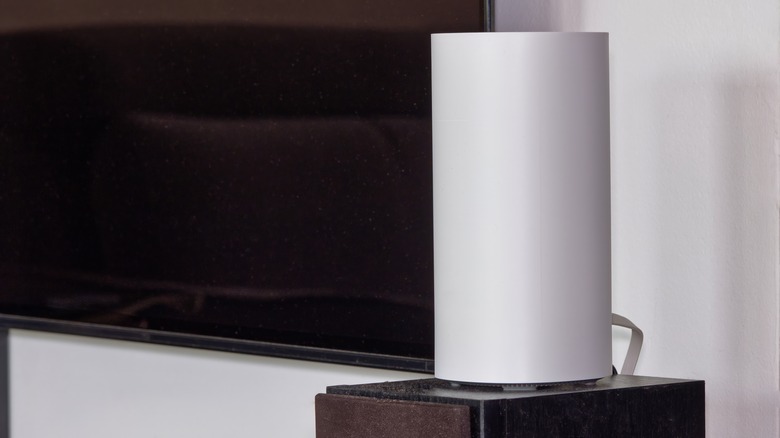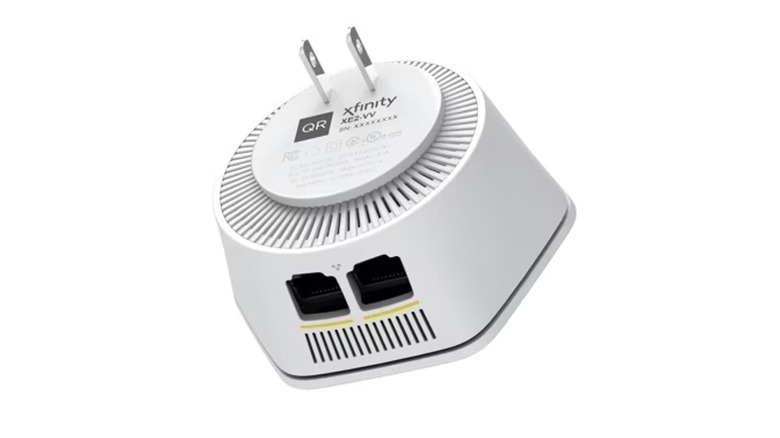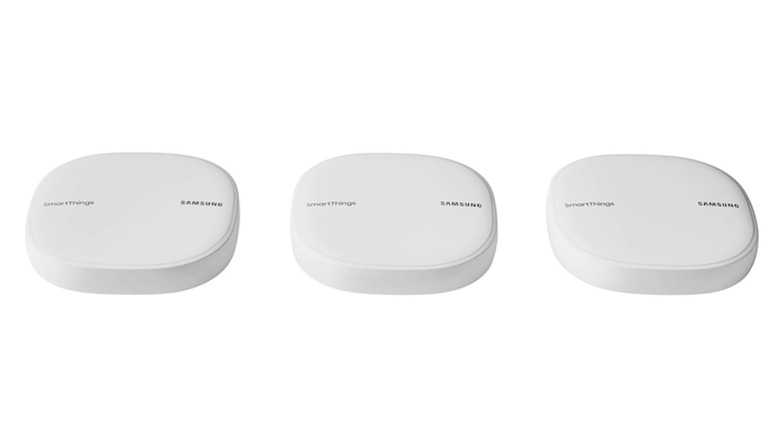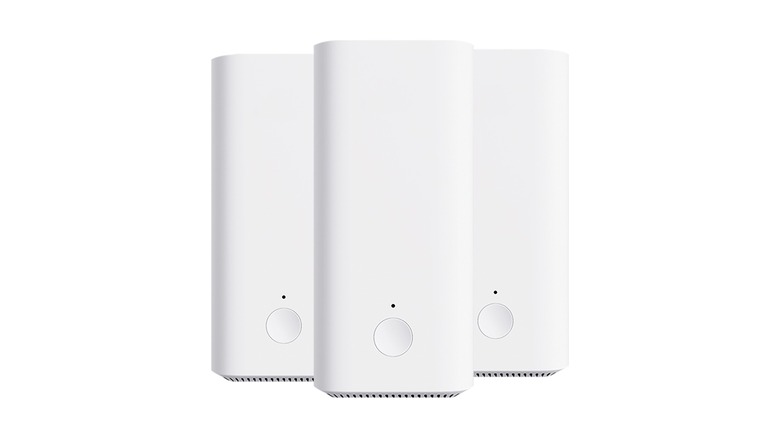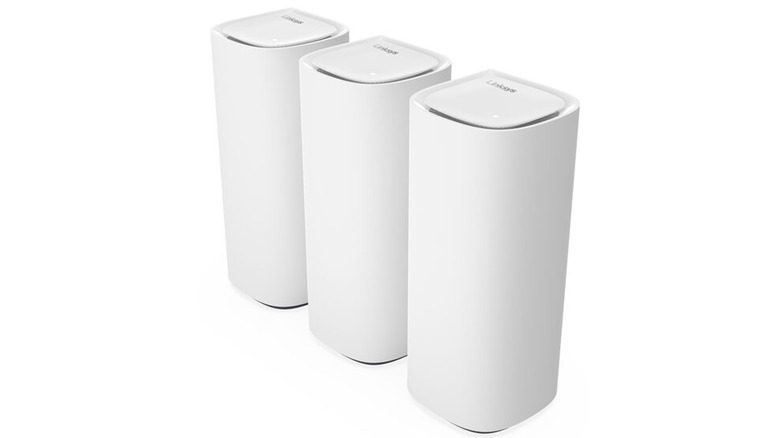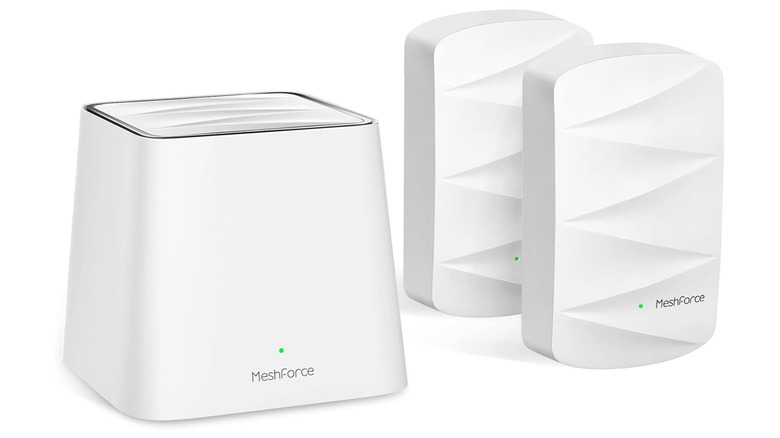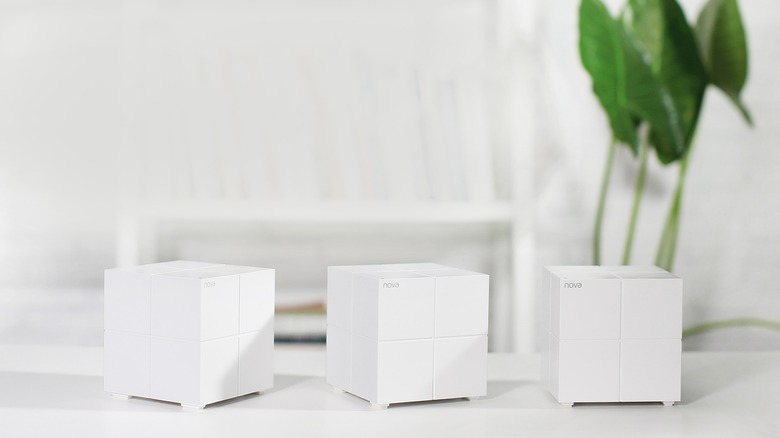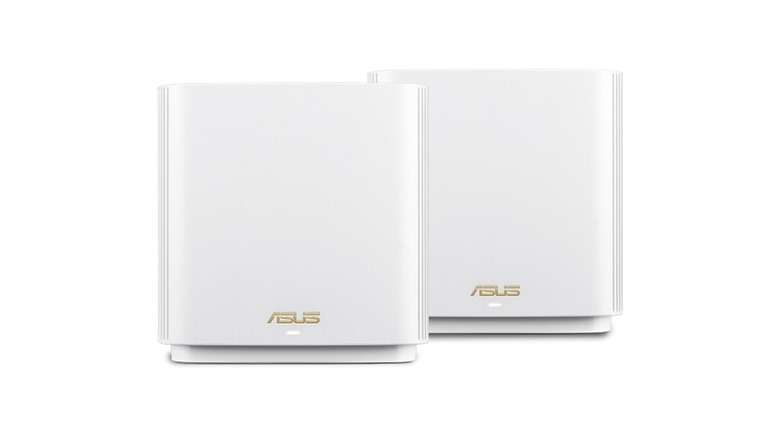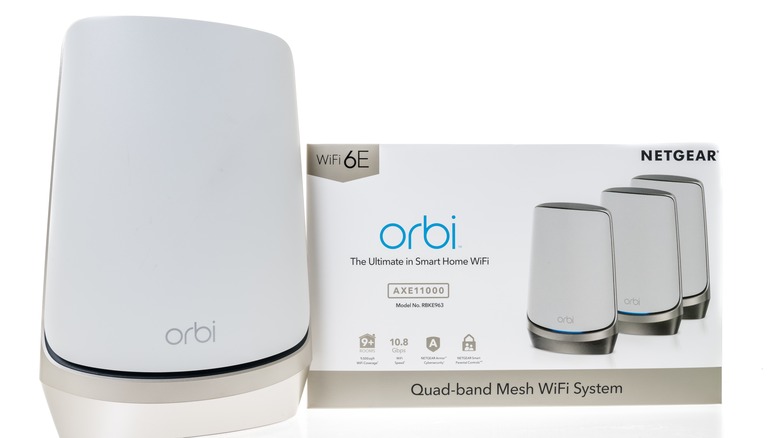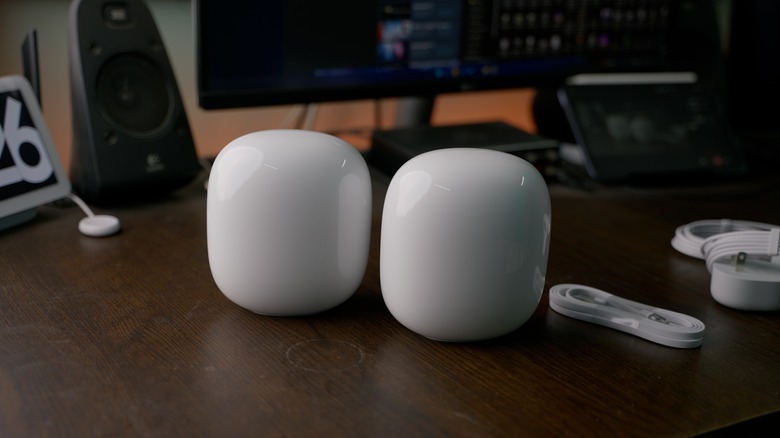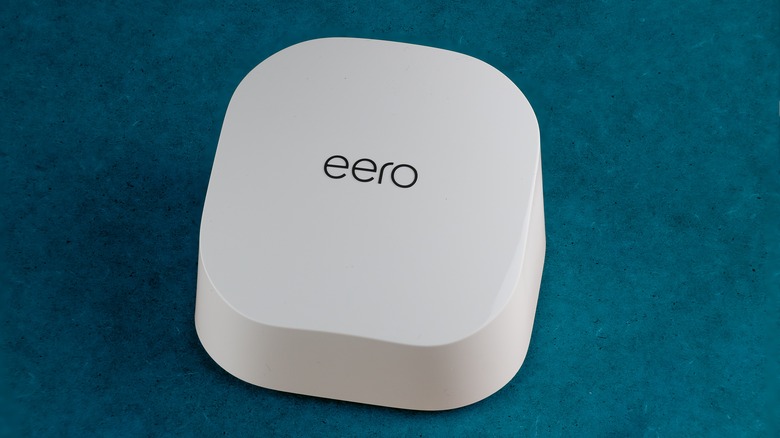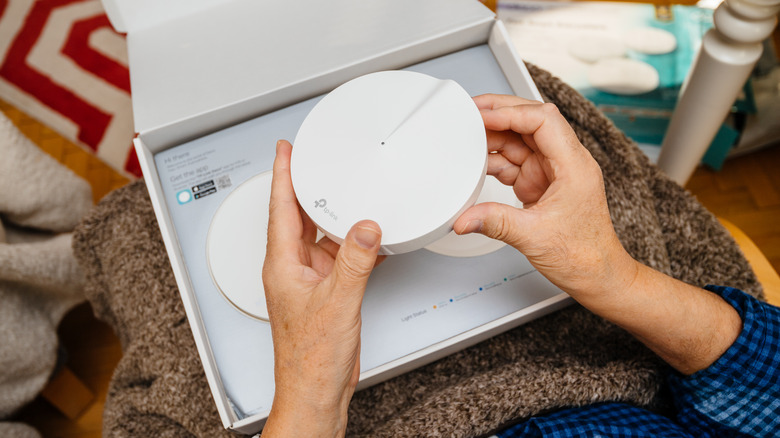Every Major Wi-Fi Mesh System Brand Ranked Worst To Best
We may receive a commission on purchases made from links.
Wi-Fi allows for some of the greatest at-home conveniences a person can have, but it can also lead to some of the greatest frustrations. When you live in a big house, the limited range of a single router won't be able to get everywhere at once. If relying on ethernet cables isn't realistic, you should consider whether mesh networking could fix your Wi-Fi woes, instead.
Wi-Fi mesh systems are a collection of routers working in tandem with each other. By setting them up in various places around a household, they should — in theory — allow for a strong and stable internet connection no matter where in your house you are. Unfortunately, even some of the biggest companies out there struggle to make a decent mesh system, with common problems arising from unstable or slow connections. Many of these problems end up in multiple offerings from the same brand, so consumers should be aware of what choices they can make.
11. Xfinity
Xfinity is known for being an Internet provider, so it stands to reason that its products would be top-notch when it comes to connectivity. However, the company only has one option for a mesh system in its xFi Pod WiFi Extenders, with each one priced at around $100. Since it's being sold by Xfinity, these extenders can only be used with Xfinity routers, and you won't be able to get one if you're not an Xfinity subscriber. Even with compatible devices, the design of these extenders can be tricky to work with due to the plug being located directly on the unit. Of course, the most important aspect of a mesh system is its reliability, but even this aspect of the extenders ends up falling short.
Among consumer and editorial reviews, the xFi Pods are one of the few Wi-Fi mesh systems with average ratings of below 3.5 stars. Their consistency does not seem to be completely up to par, with common complaints focusing on how well they can maintain connections at longer ranges. While the Pods help to give a boost to download speeds thanks to their tri-band support, their limitations in both compatibility and range put them on poor ground compared to other mesh systems.
10. Samsung
Samsung puts a great deal of its focus on mobile devices, which makes it especially likely to make great use of Wi-Fi mesh systems. The company happens to have its own offering in this area, as well, with the SmartThings Wifi router. As the name implies, this router allows connectivity with multiple smart devices in a home on top of supposedly adding 1,500 square feet of Internet range. Much of this extra connectivity is managed through the device's SmartThings app, which some users may find convoluted, but it's a great help for those who can make full use of it.
In terms of ratings, the SmartThings router manages to beat out Xfinity's xFi Pods fairly well on places like Amazon. However, on Samsung's official website, reviews are notably more critical of the system's poor longevity and support. Wi-Fi strength is inconsistent from user to user, and as a router, SmartThings is unimpressive even at its best. Overall, this device seems to be better used as a hub for smart homes rather than as a Wi-Fi mesh system.
9. Vilo
Vilo isn't as well-known as other companies on this list but it aims to offer competitive Wi-Fi mesh performance at reasonable costs. The company also provides multiple options depending on consumer needs, with a Wi-Fi 5 system being offered alongside a more expensive Wi-Fi 6 version. At around $150 for a two-pack of the Wi-Fi 6 system, these options are among the most affordable out there.
Due to Vilo's relatively lower profile, it lacks a wide range of reviews to pull from. Reviews of the Wi-Fi 5 system generally praise its value and simplicity, though some have found the Wi-Fi 6 system to not match up in terms of performance and reliability. Both versions also lack many security options, and as one might expect from the price, their speeds just don't stand up to other mesh systems out there. Still, Vilo manages to fill a niche of budget Wi-Fi mesh options.
8. Linksys
Linksys is a company with an even greater focus on mesh systems and Wi-Fi in general. It offers a wide range of products, and some of its pricier options include the most modern technologies, like Wi-Fi 7. The cheaper options are also a bit expensive, but reviews are nothing short of glowing. Highlights of the product include its ease of setup and massive range, reaching up to around 4,500 square feet.
The greatest downside to these products is really just the price. A two-pack of the Wi-Fi 5 system goes for around $170, though discounts happen. However, the newer Wi-Fi 7 systems can be as costly as $300 for just one router. The company's high-end systems have also been criticized for lacking features and underperforming, which might make the high price harder to swallow. Linksys is far from the worst brand to get a Wi-Fi mesh system from, but you may want something with more features, given the price.
7. Meshforce
Meshforce, similarly to Vilo, lacks the fame of most other mesh Wi-Fi manufacturers while still focusing almost solely on that particular market. The company provides numerous different Wi-Fi mesh system options. Its most premium choices still focus solely on Wi-Fi 5, but this allows the brand to keep costs fairly low. Its most expensive three-pack costs under $270. Plus, the system provides incredible power and reliability, reaching fantastic speeds even at ranges around 2000-6000 square feet.
The Meshforce M3 is the company's highest-rated product, boasting an especially high number of positive reviews. However, these reviews have become more negative recently, mentioning how the router had problems upon arrival and lacked security options. The M7 received similar recent complaints on top of stability issues and a lack of settings. If you're going to buy into this system, make sure the units you get aren't the ones people are complaining about.
6. Tenda
Compared to other items on this list, Tenda's most popular products have fairly low average ratings, but this average comes into a better perspective when looking at the actual numbers. Just one product from Tenda, the MW6 mesh system, boasts over 10,000 reviews on Amazon alone and still has a fairly decent overall rating. It also has a wide selection of other products with even higher averages, and while their numbers aren't quite as impressive, they still manage to reach above 1,000.
Feature-wise, Tenda is a decent competitor to previously mentioned brands on this list, especially at its price point. Less than $100 for a 6,000-square-foot three-pack system is nothing to scoff at, and around $300 for a three-pack compatible with Wi-Fi 6 is fairly respectable. Unfortunately, some customers have noted issues with getting everything set up, while others could hardly connect online or receive support. Even so, as a bargain mesh Wi-Fi option, Tenda manages to be a fine choice that doesn't require a great deal of money-burning.
5. Asus
Asus tends to make flashy products and experimental design choices, and this extends to its Wi-Fi mesh systems, with routers that feature many unique visual designs and internal specs. Its most popular mesh systems boast AI-enhanced security and speed, covering around 5,800 square feet with just two units and providing specific boosts to things like video games. Prices can vary greatly, though, with one Wi-Fi 6 compatible 3-pack priced around $200-300, and another priced at around $400-$500.
The company's most popular mesh products don't have as many consumer reviews as Tenda's, but its average ratings are far more impressive. Built-in security services and fantastic long-range coverage are among the biggest reasons to consider Asus for these types of systems. Negative reviews of these products are next to nonexistent, with only a few complaints about setup and reliability. For the most part, Asus manages to earn its spot as one of the top Wi-Fi router brands.
4. Netgear
Netgear puts a lot of effort into providing high-quality Wi-Fi solutions, and that includes mesh systems. Its Orbi series has received thousands of positive reviews. These systems feature some of the most reliable and powerful signals, with a basic two-pack of routers capable of covering 5,000 square feet of space. When it comes to speed, Orbi is pretty much unmatched – reviews praise its impressive performance even among similar mesh systems. Considering the extra features like parental controls and a year-long security subscription, it's clear Netgear is competing with the best Wi-Fi mesh systems out there.
However, there is a major downside: Netgear mesh Wi-Fi systems are super expensive. Its cheapest router set is priced above $100 per unit, and the strongest Orbi option available — a 3-pack of Wi-Fi 7 compatible routers —can cost upward of $2,000. Even for the most modern Wi-Fi technology out there, that's a ton of money. Netgear might very well be the best Wi-Fi mesh brand out there, but only if you've got an unlimited budget.
3. Google
Google might be the biggest tech company in the world, and that experience shows when looking at its mesh systems, except for one exception. The Nest Wifi Pro is notably costly at $200 for just one router, and most reviews focusing on it aren't as glowing as they could be. However, the company's other options are noticeably cheaper while having far more positive reviews, to the point where they're almost universally loved. The cheaper options in Google's Wi-Fi mesh system offer some of the greatest value a customer can get.
The feature set of Google's cheaper mesh systems isn't amazing — it only offers dual-band support and each router only covers between 1,500 and 2,200 square feet. Still, their performance and general support are consistently impressive, making sure as few customers as possible end up with reliability or speed issues. The Nest Wi-Fi mesh system will be good for people working from home, and anyone else who just wants a simple system that works well.
2. Amazon (Eero)
As one might expect, Amazon's own mesh Wi-Fi system happens to have a large number of ratings on its website, reaching above 18,000 reviews. What might not be expected is how positive these ratings are, with the company's various Eero systems constantly reaching above four stars. A few of them even manage to reach near a 4.5 average, though some people don't like needing a monthly subscription to get all the features they need. When it comes to basic users, though, the ease of setup combined with reliability and power make the Eero system exceptional.
Notably, these positive reviews persist even outside of Amazon. While some reviews have noted the high cost of more modern models, they still praise the performance of cheaper Eero versions that only reach to around 1,500 square feet. The biggest reason to get a mesh Wi-Fi system is to have reliable internet throughout an entire living space, and the Eero fills that role perfectly. Advanced users might still be disappointed with the overall package, but anyone who just wants the basics won't have much of a reason to turn away from Amazon.
1. TP-Link
Between the words of both customers and professionals, TP-Link is perhaps the highest-rated mesh Wi-Fi brand out there. The Deco M5 is its most popular model, and the only mesh system to have over 20,000 reviews and maintain a 4.6 average star rating on Amazon. The company has a wide selection of routers notably less expensive than the competition, even with modern technologies like Wi-Fi 6E. The brand's mesh systems only fall short when it comes to speed, and even then, only in comparison to the absolute fastest options out there.
Interestingly, TP-Link mesh systems combine a lot of the benefits of systems offered by other brands. More advanced offerings provide AI-driven enhancements and extra security options, while still being exceptionally easy to set up. Its Deco M9 Plus system even offers smart home hub features without sacrificing performance or reliability. When putting everything into perspective, it's hard to argue against TP-Link earning the top spot as the greatest mesh Wi-Fi brand out there.
Methodology
Mesh Wi-Fi performance is impacted by a lot of things, especially external factors like the internet package you've purchased from your ISP. Because of this, we considered both consumer and editorial reviews in making our deliberations. Looking at the average ratings and the overall number of reviews provided a good indication of whether people could easily make full use of different products. Other factors taken into consideration included pricing, feature set, and overall performance.
While these rankings should give a good idea as to which Wi-Fi mesh brands are the most generally reliable, your experience may vary. You might have far more luck with Xfinity's offerings than TP-Link's, while others might find Amazon and Google to be in completely different fields when it comes to reliability and performance. In the end, this article is not meant to be a buyer's guide, but a general comparison of how well each company holds up as a mesh Wi-Fi brand.
